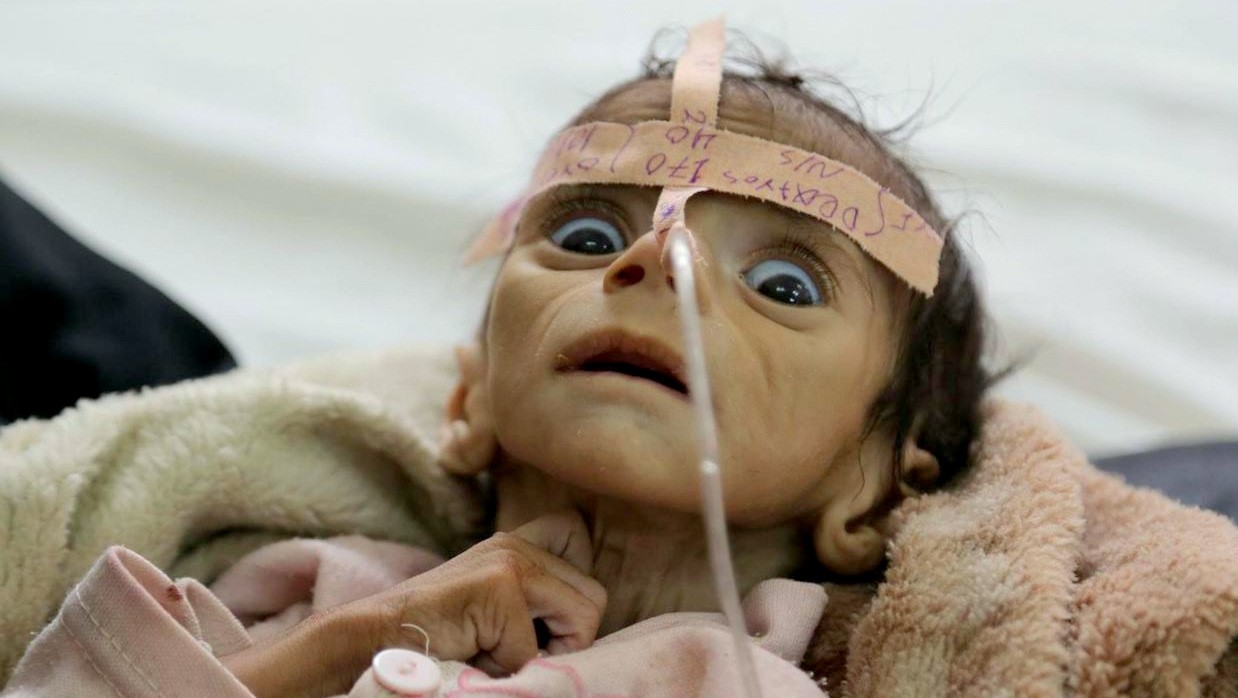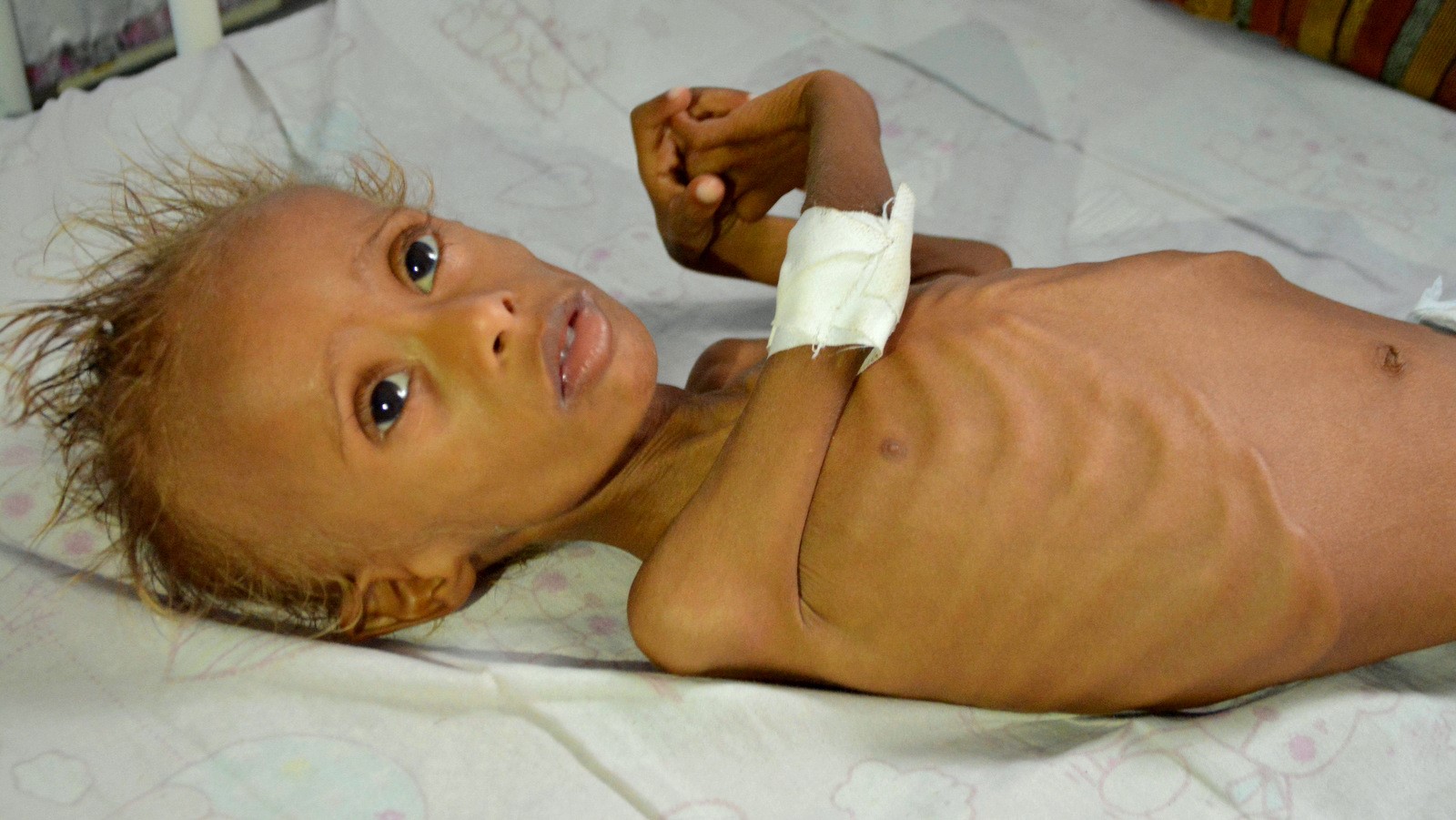Starvation & The Forgotten War: Child Malnutrition Rates Up 200% In Yemen Since 2014
By MintPress, December 8, 2016. ‘Yemen is being slowly starved to death,’
declared a representative of the humanitarian NGO OxFam. ‘This is not by
accident – it is systematic.’
declared a representative of the humanitarian NGO OxFam. ‘This is not by
accident – it is systematic.’

Udai Faisal, who is
suffering from acute malnutrition, is hospitalized at Al-Sabeen Hospital in
Sanaa, Yemen. Udai died not long after the photo was taken. Hunger has been the
most horrific consequence of Yemen’s conflict and has spiraled since Saudi
Arabia and its allies, backed by the U.S., launched a campaign of airstrikes
and a naval blockade a year ago. (AP Photo/Maad al-Zikry, File)
suffering from acute malnutrition, is hospitalized at Al-Sabeen Hospital in
Sanaa, Yemen. Udai died not long after the photo was taken. Hunger has been the
most horrific consequence of Yemen’s conflict and has spiraled since Saudi
Arabia and its allies, backed by the U.S., launched a campaign of airstrikes
and a naval blockade a year ago. (AP Photo/Maad al-Zikry, File)
SANAA, Yemen — As the world focuses on the
crisis in Syria, a U.S.-backed, Saudi-led coalition continues its war on Yemen,
targeting the civilian population with starvation and the destruction of
infrastructure crucial for survival.
crisis in Syria, a U.S.-backed, Saudi-led coalition continues its war on Yemen,
targeting the civilian population with starvation and the destruction of
infrastructure crucial for survival.
At least 10,000 people have died in the conflict, mostly civilians, but a looming hunger crisis could drive that
toll far higher.
toll far higher.
“An entire generation could be
crippled by hunger,” declared Torben Due, country director for the World Food Program, in a Oct. 25 report
from the U.N. News Service.
crippled by hunger,” declared Torben Due, country director for the World Food Program, in a Oct. 25 report
from the U.N. News Service.
According to a WFP investigation
into hunger carried out in June, some 14.1 million Yemeni, or 51 percent of the
population, are food insecure, many of them children.
The WFP estimates it will need to care for about 700,000 children under five,
pregnant women, and nursing mothers in order to prevent “moderate acute
malnutrition.” Also known as wasting, this condition can cause severe, long-lasting
effects on children’s cognitive and physical development.
into hunger carried out in June, some 14.1 million Yemeni, or 51 percent of the
population, are food insecure, many of them children.
The WFP estimates it will need to care for about 700,000 children under five,
pregnant women, and nursing mothers in order to prevent “moderate acute
malnutrition.” Also known as wasting, this condition can cause severe, long-lasting
effects on children’s cognitive and physical development.
The crisis in Yemen, along with
conflicts in Syria, Iraq, Nigeria, South Sudan and elsewhere, has prompted the United Nations to request
a record-breaking $22.2 billion in humanitarian aid for 2017, the news service reported on Monday.
conflicts in Syria, Iraq, Nigeria, South Sudan and elsewhere, has prompted the United Nations to request
a record-breaking $22.2 billion in humanitarian aid for 2017, the news service reported on Monday.
Jim Clarken, the chief executive of the
humanitarian NGO Oxfam in Ireland, accused the Saudi-led coalition of
deliberately targeting the civilian population through starvation. In a report
published Wednesday, Clarken explained the situation to the Irish news website
BreakingNews.ie:
humanitarian NGO Oxfam in Ireland, accused the Saudi-led coalition of
deliberately targeting the civilian population through starvation. In a report
published Wednesday, Clarken explained the situation to the Irish news website
BreakingNews.ie:
“Yemen is being slowly starved to
death. First there were restrictions on imports – including much need food –
but when this was partially eased the cranes in the ports were bombed, then the
warehouses, then the roads and the bridges. This is not by accident – it is
systematic.”
death. First there were restrictions on imports – including much need food –
but when this was partially eased the cranes in the ports were bombed, then the
warehouses, then the roads and the bridges. This is not by accident – it is
systematic.”

Salem, 5, who suffers
from malnutrition, lies on a bed at a hospital in the port city of Hodeidah,
southwest of Sanaa, Yemen. Even before the war, Hodeidah was one of the poorest
cities in Yemen, the Arab world’s most impoverished nation. Now, the destruction
of the port city’s fishing boats and infrastructure by Saudi-led airstrikes
means the U.N. estimates 100,000 children in the province are at risk of severe
malnutrition. (AP Photo)
from malnutrition, lies on a bed at a hospital in the port city of Hodeidah,
southwest of Sanaa, Yemen. Even before the war, Hodeidah was one of the poorest
cities in Yemen, the Arab world’s most impoverished nation. Now, the destruction
of the port city’s fishing boats and infrastructure by Saudi-led airstrikes
means the U.N. estimates 100,000 children in the province are at risk of severe
malnutrition. (AP Photo)
The Saudi military, supported by
a coalition of other Middle Eastern states and backed by U.S. military
assistance, began the attack in March 2015, a few months after the Houthis took
power in Yemen in a coup.
a coalition of other Middle Eastern states and backed by U.S. military
assistance, began the attack in March 2015, a few months after the Houthis took
power in Yemen in a coup.
Although the offensive was
ostensibly aimed at forcing the Houthis out of power again, the Saudis have
deliberately targeted civilians and vital civilian
infrastructure from wells to hospitals.
ostensibly aimed at forcing the Houthis out of power again, the Saudis have
deliberately targeted civilians and vital civilian
infrastructure from wells to hospitals.
Fergal Keane, a BBC reporter in northern Yemen, reported on Tuesday that child
malnutrition rates have increased 200 percent since the conflict with the
Houthis broke out in 2014. According to U.N. data, 3.3 million people have been
internally displaced by fighting and 19.4 million lack access to clean drinking
water or sanitation.
malnutrition rates have increased 200 percent since the conflict with the
Houthis broke out in 2014. According to U.N. data, 3.3 million people have been
internally displaced by fighting and 19.4 million lack access to clean drinking
water or sanitation.
“Key roads and bridges are
frequently attacked, making the delivery of assistance even more difficult,”
Keane wrote.
frequently attacked, making the delivery of assistance even more difficult,”
Keane wrote.
Some 51 percent of hospitals and
other medical facilities have also been rendered inoperable by the war. On
Wednesday, the World Health Organization reported that there are critical shortages of doctors in
about 40 percent of the country. Of 276 districts in Yemen surveyed by the WHO,
49 had no doctors available at all.
other medical facilities have also been rendered inoperable by the war. On
Wednesday, the World Health Organization reported that there are critical shortages of doctors in
about 40 percent of the country. Of 276 districts in Yemen surveyed by the WHO,
49 had no doctors available at all.
An anonymous human rights
activist from Yemen who tweets as @Living_Yemen and volunteers with a
local NGO called Your Ability Organization, warned that Yemeni children are dying of preventable diseases
and that even a cold or fever can become deadly due to malnutrition and the
lack of available medical care.
activist from Yemen who tweets as @Living_Yemen and volunteers with a
local NGO called Your Ability Organization, warned that Yemeni children are dying of preventable diseases
and that even a cold or fever can become deadly due to malnutrition and the
lack of available medical care.
“Emotionally it’s a never ending
pain with an entire generation of children scarred for life,” the activist wrote in The Guardian on Tuesday.
pain with an entire generation of children scarred for life,” the activist wrote in The Guardian on Tuesday.
At best, attempts by the U.N. to
negotiate peace look uncertain. On Tuesday, the exiled government of Yemen rejected a proposed roadmap to peace, which called for President
Abd-Rabbu Mansour Hadi to relinquish his power in return for the Houthis ceding
control of key cities.
negotiate peace look uncertain. On Tuesday, the exiled government of Yemen rejected a proposed roadmap to peace, which called for President
Abd-Rabbu Mansour Hadi to relinquish his power in return for the Houthis ceding
control of key cities.


